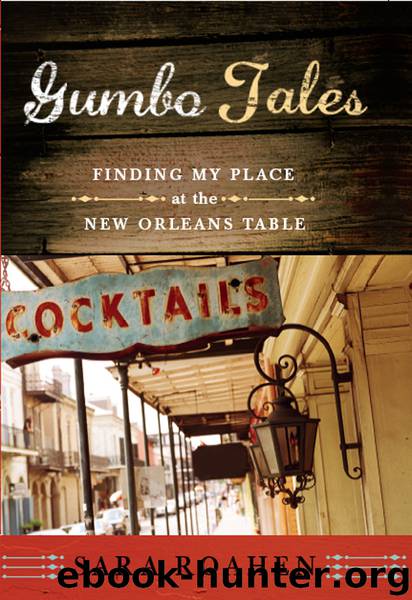Gumbo Tales by Sara Roahen

Author:Sara Roahen
Language: eng
Format: epub
Publisher: W. W. Norton & Company
Published: 2008-05-05T16:00:00+00:00
I first learned to eat boiled crawfish in the city, but perhaps not as quickly as I should have. The crawfish were running strong the day the editorial staff of Gambit Weekly took me to lunch to celebrate the publication of my first few restaurant reviews. Someone had chosen Sid-Mar’s for its lovely, and rare, view of Lake Pontchartrain. Many of my colleagues ordered boiled crawfish and returned to their keyboards with hands smelling like fishing bait. I ordered a shrimp po-boy and hoped they wouldn’t notice. My first staff outing didn’t seem like the appropriate time for divulging that the paper’s new critic hadn’t ever experienced skin-on-shell contact with a crawfish. Fortunately, the peeling ritual is a public one; I became a voyeur at once.
For urban families, Mardi Gras revelry often involves dumping sweet corn, potatoes, whole onions, lemons, garlic, celery, sinus-clearing seasonings (sold in liquid concentrate), and crawfish by the dozens of pounds into barrels of water brought to a boil over portable propane burners—all of this curbside, within scalding distance of marching bands, debutantes rolling by on floats, and children on the loose. If you hang with the right crowd, someone will have parked her pickup truck nearby so the bed can be lined with newspaper and scattered with the steaming finished product. A card table or the lid of a cooler will do. My best voyeuristic memory of Mardi Gras 2006 is of a group of teenagers standing around a cascade of crawfish that one of their fathers had just tipped from the pot. The kids were in the same position when I passed by again an hour later, still chatting and twisting and sucking, carcasses beginning to bury their feet. I wondered how much better socialized we would be today if my teenage friends and I had rallied around mounds of boiled crawfish in plain view rather than cases of warm Blatz beer beneath the bleachers.
Mardi Gras crawfish boils were particular triumphs in 2006. Storm surges from Hurricanes Katrina and Rita had scoured south Louisiana’s fields with saltwater, killing the greenery and thus hampering the crawfish life cycle; droughts before and after the storms had stymied the Atchafalaya Basin’s wild production. In February, live crawfish were going for three times the usual price, if you could find them at all. While the harvest improved over time, the early-season prices caused more local outrage than three-dollar-per-gallon gasoline, which hit here two months later.
Crawfish have a long history in Louisiana as a poor man’s food—in reputation, in stigma, and in reality. In Stir the Pot: The History of Cajun Cuisine, Marcelle Bienvenu and Carl and Ryan Brasseaux record that even as recently as the 1930s, Cajuns limited their crawfish harvests to times of flood, when they were too plentiful to ignore, and Lenten periods of fasting. The authors found newspaper articles from the 1870s that referred to crawfishing parties, “but these ventures frequently sought only bait for fishing expeditions.”
The United Houma Nation, after whom the Cajun town
Download
This site does not store any files on its server. We only index and link to content provided by other sites. Please contact the content providers to delete copyright contents if any and email us, we'll remove relevant links or contents immediately.
| Cajun & Creole | California |
| Hawaiian | Mid-Atlantic |
| Midwestern | New England |
| Northwestern | Soul Food |
| Southern | Southwestern |
| Western |
Biscuits: A Savor the South Cookbook by Belinda Ellis(4321)
The French Women Don't Get Fat Cookbook by Mireille Guiliano(3645)
A Jewish Baker's Pastry Secrets: Recipes from a New York Baking Legend for Strudel, Stollen, Danishes, Puff Pastry, and More by George Greenstein(3581)
Better Homes and Gardens New Cookbook by Better Homes & Gardens(3572)
Ottolenghi Simple by Yotam Ottolenghi(3570)
Al Roker's Hassle-Free Holiday Cookbook by Al Roker(3516)
Trullo by Tim Siadatan(3417)
Bake with Anna Olson by Anna Olson(3387)
Hot Thai Kitchen by Pailin Chongchitnant(3365)
Panini by Carlo Middione(3320)
Nigella Bites (Nigella Collection) by Nigella Lawson(3212)
Momofuku by David Chang(3176)
Salt, Fat, Acid, Heat: Mastering the Elements of Good Cooking by Nosrat Samin(3134)
Modern French Pastry: Innovative Techniques, Tools and Design by Cheryl Wakerhauser(3118)
Classic by Mary Berry(3001)
Best of Jane Grigson by Jane Grigson(2983)
Tapas Revolution by Omar Allibhoy(2967)
Solo Food by Janneke Vreugdenhil(2961)
Ottolenghi - The Cookbook by Yotam Ottolenghi(2922)
